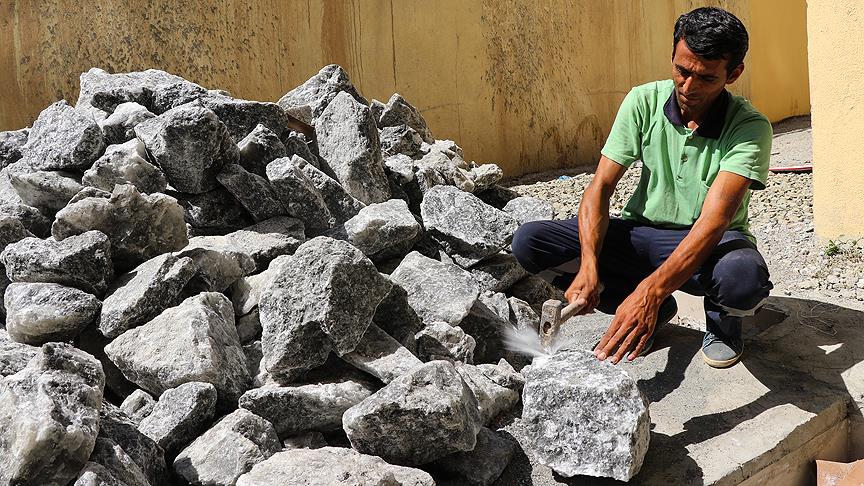Solunum yolu ve cilt hastalıkları yaşayanlar, çağın yoğun talep gösterilen alternatif tedavi yöntemlerinden olan tuz terapisi için Iğdır Üniversitesindeki “halo terapi” merkezinde şifa arayacak.
Türkiye’nin en büyük tuz rezervleri arasında yer alan Tuzluca ilçesinde Romanya, Polonya, Rusya ve Nahçıvan’dan katılan araştırmacıların da destekleriyle sürdürülen çalışmalar neticesinde rezervin bazı solunum yolu hastalıklarına iyi geldiği anlaşıldı.
Elde edilen bilgiler doğrultusunda Iğdır Üniversitesinin konukevindeki iki oda, “halo terapi” odasına dönüştürüldü.
Kentteki Tuzluca rezervinden getirilen kaya tuzlarıyla özel ustalarca tuzla kaplanan terapi odaları, solunum yolu rahatsızlıkları yaşayan vatandaşların hizmetine sunulacak.
Iğdır Üniversitesi Rektörü Prof. Dr. Mehmet Hakkı Alma, AA muhabirine yaptığı açıklamada, günümüzde yeni ortaya çıkan terapi dallarından birinin de tuz terapisi olduğunu söyledi.
Tarih boyunca saf, rafine edilmemiş kaya tuzunun akciğere, antibakteriyel ve antimikrobiyal faydaları olduğunu belirten Alma, “Son yıllarda tüm solunum yolu hastaları ve doğal astım tedavisi olmak isteyen hastalar dünyadaki tuz mağaralarını ziyaret etmekteler. Doğal tuz havasının inanılmaz iyileştirici özelliklerinden dolayı tuz mağaralarına ziyaretler artış göstermektedir. Çoğu ülkede kullanılan bir yöntem olan tuz terapisi ülkemizde de yaygınlaşmaya başlamıştır.” dedi.
“Mağaraya gidemeyen ‘halo terapi’ merkezine gelebilecek”
Tuz terapi merkezlerinin mağaralarda yapılanına “speleo terapi”, odalarda yapılanlarına ise “halo terapi” adı verildiğini belirten Alma, şunları kaydetti:
“Bu çalışmanın neticesinde kurduğumuz tuz terapi merkezi sadece yöresel ve bölgesel değil, tüm ülkemizde ayrıca dünyanın her tarafından birçok insana sağlık hizmeti verecek. Bu çalışma ile hastalar doğal bir şekilde şifa bulabilecekleri gibi, ülke ve ilin ekonomisine de önemli bir katkı sunacaktır.“
Kaynak: https://www.aa.com.tr/tr/saglik/solunum-ve-cilt-hastalari-icin-halo-terapi-merkezi/880470
***
EK 1 (29.5.2022): Do Salt Rooms Really Offer Health Benefits?
Nearly two centuries ago in Poland, a physician noticed something rather interesting about those who were toiling deep in the Wieliczka Salt Mine: They didn’t have lung issues like workers in other mines.
Today’s therapeutic salt rooms owe a debt of gratitude to that long-ago observation by Dr. Feliks Boczkowski. His belief in the healing power of salt is the foundation for the growing wellness trend of halotherapy (salt therapy).
Here’s the question, though: Do these newfangled “salt caves” deliver on touted health claims of better breathing, healthier skin and even stress relief?
Let’s take a look with functional medicine specialist Melissa Young, MD.
What is a salt room?
Salt rooms deliver a dry salt therapy experience, where the air inside the room exposes you to microscopic salt particles. There are two types of therapy rooms, according to the Salt Therapy Association:
- “Active” rooms feature machines that break salt apart and circulate the particles, allowing them to be breathed in and exposed to your skin. The practice is known as halotherapy.
- “Passive” rooms are filled with large amounts of salt. Typically, a variety of salts ― Dead Sea, Himalayan, rock salt, etc. ― fill the climate-controlled space. These are typically more meditative settings.
“For what would be considered a true halotherapy experience, you need a room with the particle generator,” says Dr. Young.
Benefits of salt room therapy
Search online and there’s no shortage of breathless testimonials about salt rooms. Anecdotally, people say they’re life-changing, especially when it comes to easing respiratory issues or infections.
When it comes to proven research, though … well, let’s just say there’s not a salt mountain of scientific evidence to support the claims.
“Sometimes, it can be frustrating that there aren’t enough well-designed studies looking at a particular treatment or the different study outcomes can be conflicting,” notes Dr. Young. “But that doesn’t mean there isn’t a potential benefit to that treatment.”
Here’s why people say they go to salt rooms.
Improved breathing
If you have trouble moving air in and out of your lungs, odds are, your condition is on someone’s list of health issues that can be made better through halotherapy. Various sites claim salt rooms can help address:
- Asthma.
- Bronchitis.
- Chronic obstructive pulmonary lung disease (COPD).
- Cystic fibrosis.
- Respiratory allergies.
- Smoker’s cough (also known as chronic cough).
So, how does this salty air make a difference? “Breathing in the salt particles appears to thin mucus, which allows your cough to be more productive and makes it easier to get phlegm out,” explains Dr. Young. “It gets things moving. That’s often key for people with breathing issues.”
But there’s just not a lot of rigorous research supporting the theory. “The data is mixed on halotherapy,” says Dr. Young.
Fight infection
The idea of using salt to clear the gunk out of your sinuses isn’t exactly groundbreaking. Saline sprays and rinses are go-to methods to rinse out your nose and sinuses for better breathing.
But does breathing in dry salt accomplish the same thing? Again, there’s not enough research to verify the claim, says Dr. Young.
Healthier skin
Allowing salt-saturated air to flow over your body is said to naturally boost your skin’s hydration, leaving it feeling smoother and looking less splotchy. There’s a lot of chatter about balancing out pH levels and clearing up eczema, too.
Is it true? You can probably guess the answer. “We don’t have scientific proof,” says Dr. Young.
(Looking for a natural route toward younger-looking skin? Try eating these foods.)
Stress reduction
A calm and dimly lit salt-filled room with soft music playing certainly presents itself as a setting ideal for meditation. “It’s an environment where you could definitely calm your nervous system and reduce stress.
But the same could be said if you took out the salt component. “You could get the same effect without it,” says Dr. Young. (Learn more about ways to practice mindfulness.)
Are there risks to visiting a salt room?
If you’re relatively healthy, spending a session in a salt room shouldn’t cause any issues, assures Dr. Young. However, she offers a few notes of caution.
- You may cough more. All of those salt particles in the air may increase your coughing for a bit. “I’ve had patients go and say they ended up coughing a lot afterward,” reports Dr. Young. “It’s just something to be aware of.”
- No defined halotherapy standards. “It’s the Wild West, with everyone doing it a different way,” says Dr. Young. She suggests looking for a salt room in an office or spa where treatment is overseen by a medical professional.
- It’s not the same as medicine. Don’t confuse a salt room session with medical care. “It is not a substitute for your medication,” says Dr. Young.
- Ask questions. If you have existing health issues, talk to your doctor before trying halotherapy to be on the safe side.
- Is a salt room worth trying?
Could a salt room be beneficial for you? “Maybe,” says Dr. Young. “It’s something that may be worth trying, especially if you have some breathing issues. But view it as an extra to your normal treatments ― not a replacement.”
Kaynak: https://health.clevelandclinic.org/salt-cave-benefits/
***


















